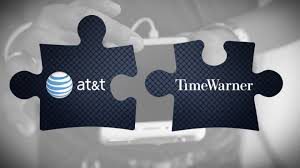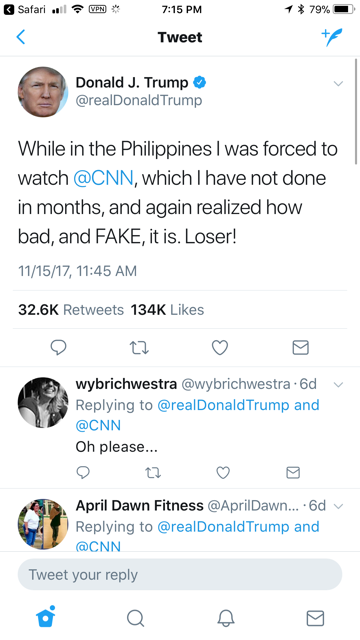21 November 2017 (Serifos, Greece) – Earlier today my team commented on The Justice Department’s move to block AT&T’s proposed $85 billion bid for Time Warner. I commend them for a fairly straight forward approach … I never interfere in the editorial process of my team; they are now in charge of the blogs/the companies … and they are probably right that regardless of speculation about political environment surrounding the transaction, the only thing the court will care about is whether the merger is a violation of the Clayton Act.
But let me voice my own views on the “political environment”. Trump and his political appointees at the Justice Department insist that the federal government’s lawsuit yesterday to block AT&T from acquiring Time Warner is not retribution for CNN’s coverage of the White House. Being a cynical old coot, I am highly dubious of their denials. Especially given Trump’s propensity to allow China a foothold in U.S. energy infrastructure (here and here) to repay all those Chinese “loans” he owes, and the continuing “shocks” of using research underwritten by business to overturn rules … the EPA decision this week just one example.
AT&T chief executive Randall Stephenson was adamant yesterday that he won’t agree to sell CNN to placate Trump, an issue that he described as “the elephant in the room.” He said he cannot say for sure why the government sued. “But nobody should be surprised that the question keeps coming up,” he said, “because we’ve witnessed such an abrupt change in the application of antitrust law here.” Telling the Justice Department to go to court to block a business transaction because of his personal animus toward a news organization, if proven, would constitute a clear-cut abuse of presidential power. And Stephenson said he is willing to go to court and will try to compel the DOJ to turn over internal correspondence, which might expose political interference. The company’s case would be much stronger if it could establish that the opposition of the government is the result of a desire to silence a dissenting voice.
Some random points on the AT&T/Warner move by the DOJ:
1. The obvious. Trump has made no secret of his deep personal disdain for CNN. Trump said during a fundraiser for his 2020 campaign … yes, he is already raising money for 2020 … at the Trump hotel in June that the people who work at CNN are “horrible human beings.” He tweeted this just last week:
Most notoriously, Trump said “Deals like this destroy democracy” at a rally last October when he was especially mad about CNN’s reporting.
The Wall Street Journal reported that two weeks ago that Trump’s son-in-law and senior aide, Jared Kushner, met with a top executive at CNN parent company Time Warner earlier this year and told him that 20 percent of the cable network’s staff should be fired because of their coverage of the 2016 election. The White House claimed Kushner was making a point and didn’t intend for the 20 percent number to be taken seriously, but the Journal said that it was within Time Warner.
2. In every other area, the Trump administration is bending over backward to boost big business. This lawsuit is ideologically inconsistent and discordant with the rest of their agenda. The biggest critics of the merger have been hard-left liberals who oppose the concentration of corporate power, so it’s odd to see Trump’s DOJ throw in their chips with people like Al Franken, Bernie Sanders and Elizabeth Warren.
At the same moment DOJ is filing suit, for example, FCC chairman Ajit Pai has moved swiftly to get rid of net neutrality rules (see today’s announcement) that were put in place during the Obama administration. This would allow Verizon to deliver content from Yahoo, which it owns, faster than it delivers content from Google or to slow down Google’s services to push customers toward its own products, for example.
Getting rid of net neutrality demonstrates the administration’s lack of broad-based concern about consumer protection.
3. The head of the antitrust division has changed his view on the issue to match Trump’s. In October 2016, two days after Trump decried the AT&T-Time Warner merger at a rally, Makan Delrahim expressed the opposite view during a television interview. “I don’t see this as a major antitrust problem,” he said. “I think these folks would have an easier route toward approval” compared with other deals.
4. My favorite. The administration’s denials are full of lawyerly language that leaves wiggle room. Asked 10 days ago about reports that the DOJ told AT&T it would need to spin off CNN for the merger to go through, Trump told reporters: “I didn’t make that decision. It was made by a man who’s a very respected person, a very, very respected person. … I did make a comment as to what I think. … I do feel you should have as many news outlets as you can — especially since so many are fake.”
The head of the antitrust division who Trump was referring to, Delrahim, says he was never given instructions by the White House on how to conduct his analysis of whether the merger would be anticompetitive. “I have never been instructed by the White House on this or any other transaction under review by the antitrust division,” Delrahim said in a statement. But one would not need to receive an explicit order from the president to cater to his preferences, and Trump admits making a comment about what he thinks. White House spokesman Raj Shah said in a separate statement on Nov. 8 that Trump has not spoken with Attorney General Jeff Sessions about the proposed acquisition, “and no White House official was authorized to speak with the Department of Justice on this matter.”
NOTE: before being named assistant attorney general in charge of antitrust, Delrahim spent six months as a top lawyer inside the White House and managed Neil Gorsuch’s Supreme Court nomination. Did he have conversations with Trump regarding Time Warner before he got confirmed? Nah.
5. Trump has repeatedly demonstrated that he does not respect the independence of the Justice Department. Why would he prize the autonomy of the antitrust division any more than he did the FBI? Think of all Trump’s criticisms of Sessions, his decision to fire James Comey as FBI director and his calls for Hillary Clinton to be investigated.
6. Full credit to Brian Fung for this one. He covers the law and technology for the Washington Post. There are no precedents for this kind of lawsuit succeeding, he says. Until very recently, the $85 billion acquisition looked like a done deal because previous administrations, including Barack Obama’s, allowed vertical mergers that didn’t involve direct competitors. Comcast’s deal to buy NBC in 2011 was similar to this transaction, for example. Brian notes on his blog:
“The move by the Justice Department’s antitrust division is unusual because it challenges a deal that would combine two different kinds of companies — a telecom with a media and entertainment company. Antitrust officials are relatively untested in the courts on opposing such deals and have rarely tried to squash them. Even beyond the politics surrounding the case, the Justice Department may not have an airtight economic argument against the AT&T-Time Warner deal, some analysts said.”
This simply smacks of politics. Ever since the Nixon administration secretly meddled in antitrust policy, both parties have tried to keep raw partisan politics out of it. Presidents appoint certain types of lawyers to head the Justice Department and Federal Trade Commission antitrust units, then leave them alone to conduct independent reviews that follow the facts and the law. At least that was the practice until Trump became president. None of this makes any sense outside of political vendettas. Turner Broadcasting is fairly small potatoes in terms of market power. If the AT&T-Time Warner case goes to court, the administration is highly likely to lose, but not before wasting a lot of taxpayer and shareholder money on legal fees in the process.
Wow. What a surprise. Trump behaving once again like a tin-pot dictator, trying to punish a media company that has dared to cover him honestly, aggressively and accurately. He has called on the Justice Department to open an investigation into bogus scandals involving his opponent in last year’s election, as a candidate he threatened Jeff Bezos, the owner of The Washington Post, with ‘such problems’ once he got elected. And just last month, Trump threatened to look into pulling NBC’s broadcasting license after the network reported that the president was contemplating a dramatic increase in the nation’s nuclear arsenal.
When Trump threatens to use the powers of government against his critics and foes, as if a federal agency were just a weapon for his personal use, he makes it tough for anybody to believe that any major policy decision by his administration is being judged on its merits. That is America’s future.

